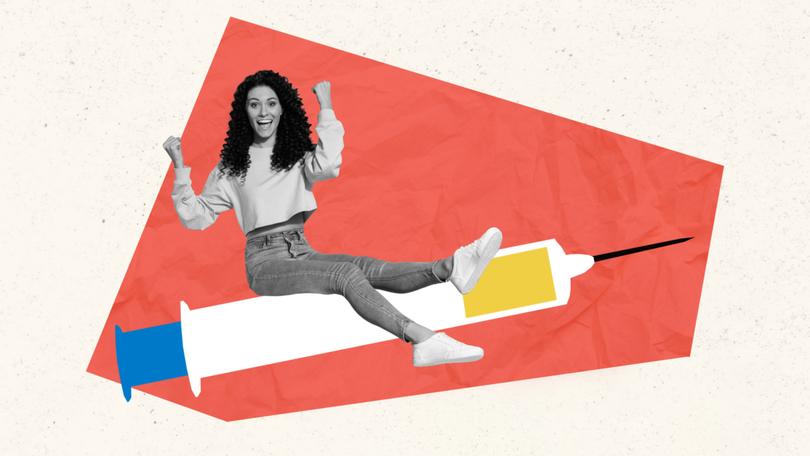KATE EMERY: What the ‘Last Supper’ furore at the Olympics teaches us about vaccines
The value of a good education has been highlighted by — who saw this coming? — the world of sport after people got angry at the Olympic opening ceremony for mocking Christianity.

The value of a good education has been highlighted by — who saw this coming? — the world of sport after people got angry at the Olympic opening ceremony for mocking Christianity.
Everyone from Barnaby Joyce (“highly offensive, hurtful and an insult”) to Michael McCormack (“Christian soldiers … died to save that country”) lathered up to criticise a less-than-respectful recreation of Leonardo Da Vinci’s The Last Supper.
Sadly those critics were forced to take part in a new Olympic event when they almost immediately faced an embarrassing climb down from their soapbox shortly after the ceremony’s artistic director revealed the tableaux wasn’t about The Last Supper at all.
Sign up to The Nightly's newsletters.
Get the first look at the digital newspaper, curated daily stories and breaking headlines delivered to your inbox.
By continuing you agree to our Terms and Privacy Policy.Rather, it was a tribute to the Greek God of fertility, wine and revelry, Dionysus. And, as some art fans were quick to point out, it had more in common with Jan van Bijlert’s The Feast of the Gods than Da Vinci’s masterpiece.
Possibly the semi-naked blue man with the headpiece made of grapes should have been our first clue.
Look, I can’t pretend I clocked the fruit-laden cerulean lumberjack as a dead ringer for Dionysus but I don’t pretend to know much about art or Christianity (or sport, while I’m at it). Nor was I accusing a nation of trying to start a religious war.
It was for different reasons entirely that I spent this week worrying about the state of Australia’s education system after witnessing first-hand just how little some people understand about vaccines.

In some ways the fault was mine. When I saw WA’s whooping cough spike was particularly bad in the South West, where vaccination rates are lower than average, I wanted to know why.
When I’ve written about anti-vaxxers and the vaccine-hesitant before it’s been about COVID, not why people might opt against vaccines for which there are often decades of evidence, including but not limited to whooping cough, influenza and HPV.
An online shout-out to South West locals to talk about vaccinations seemed like a good idea at the time.
What I found was less a deeply ideological opposition to vaccines than a bunch of misunderstandings about vaccines and how they are supposed to work.
Like these:
Healthy people don’t need vaccines
Not true. For a healthy person being vaccinated against, say, influenza can reduce the risk of dying of the disease by two-thirds.
Vaccines injure more people than they help
Not true. Vaccine injuries are very rare, while vaccines are estimated to have saved 154 million lives, mostly infants, in the past 50 years.
Vaccines don’t prevent people from catching a disease
This one is true. Vaccinated people can and do get infected. But, if they do, they are far less likely to get seriously sick or die — that is the point.
Nobody dies of, like, measles or the flu anymore
Unfortunately, they very much do. And if Australia lets its vaccination rates fall much below what we need for herd immunity, those numbers will only rise.
I could go on but I’m preaching to the converted here; most Australians understand and value vaccinations.
Still, I wonder if high schoolers spent more time in science learning about vaccines — instead of, I don’t know, the difference between xylem and phloem or why Pluto isn’t a planet any longer — would fewer Australians would get sucked into the anti-vax vortex?
Anyone who thinks whooping cough, or pertussis, isn’t serious should acquaint themselves with little Riley Hughes, who died of whooping cough in 2015 at one-month-old.
Too young for the vaccine, he may have been protected had his mother been vaccinated while pregnant (which is now the norm).
It needs to be said that there’s no proof the low vaccination status in the southwest of WA is responsible for the severity of the whooping cough spike.
That doesn’t mean there isn’t a correlation, it just means it’s a tough one to prove without an epidemiologist.
But educating ourselves about vaccines — and remembering to get them — is key to protecting our kids.
Otherwise, their last supper might come sooner than we think.
Originally published as Kate Emery: Vaccines remain key to preventing The Last Supper from becoming reality
